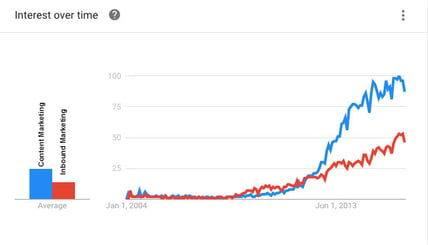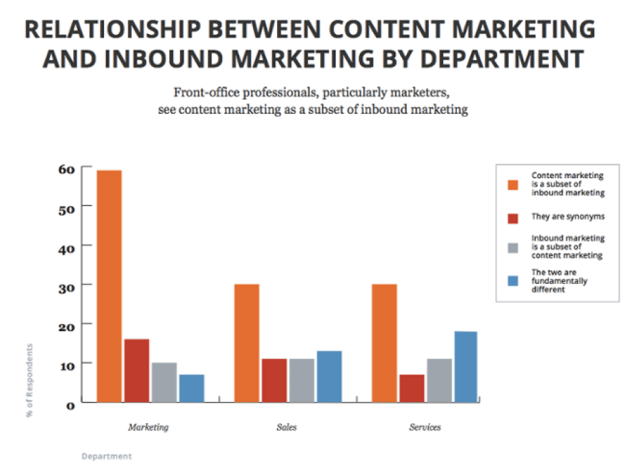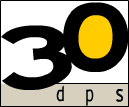Inbound Marketing or Content Marketing – Which Is It?

We talk a lot about both inbound marketing and content marketing here at 30dps. While neither notion is really new, both terms have grown sharply in popularity and acceptance in just the last few years. 
Driven in large part by two firms (i.e. inbound marketing by HubSpot and content marketing by Content Marketing Institute), the interest in these two terms has exploded in recent years, as reflected in this Google Trends chart.
Even here on our blog we often speak of them as if they were the same thing (largely for the sake of simplicity), but the truth is, they are signficiantly different. So for those who do not know this distinction, we'll try to clarify.
What is inbound marketing?
The days when consumers made purchase decisions based solely upon TV, radio, and print advertising are largely gone. Today, when consumers are interested in something, or have a specific need, they almost always turn to the internet to research their options. The concept of inbound marketing is based upon the premise that customers are turned off by being interrupted with traditional advertising and prefer to seek out a company or service for themselves—when they are ready.
When a prospective customer visits a website, they are “inbound” to that business. Inbound marketing then, is the discipline of strategically driving that inbound traffic, anticipating the needs of those they intentionally attract (largely through search engines and social media), and presenting them with content and messaging designed to compel them to accept a well-targeted offer or respond to a call to action. An important aspect of inbound marketing is presenting the right content to the right customer at the right time—matching the content not only to the correct persona, but also to the appropriate stage of the buying cycle of each persona. In order to facilitate that, inbound marketing is typically supported by a marketing automation platform that helps develop, present, manage, and measure all of the activities of the marketer. (Click this link to download the FREE State of Inbound Marketing 2015 research report by HubSpot.)
What is content marketing?
Content marketing involves the creation of unique, helpful, instructive, and engaging content that is tied to the specific needs of a typical customer or prospect. While "gating" the content is a core tenet of inbound marketing, the core belief for content marketing is that you gain the trust, brand loyalty, and a willingness to share your content when you don't require something from the consumer every time they consume your content.
Content marketing has emerged as a profoundly powerful way to build relationships with prospective customers. By being sensitive to the fact that consumers are tired of being inundated with "pushy" sales-speak, and by focusing on providing valuable, strings-free information, the trusting relationships that result are not only more likely to result in sales, but ultimately to produce fanatical evangelists for your brand. Certainly, there are a number of tools that make life easier for content marketers to do what they do better, but unlike inbound marketing, which is heavily dependent upon the techology to be successful, content marketing can even prove effective via traditional print delivered by the USPS.
What's the difference between inbound marketing and content marketing?
Content marketing is essentially a subset of the practices and principals of inbound marketing; but content marketing can exist without inbound marketing while inbound marketing can't really exist without content marketing.
HubSpot's research on this topic (presented in the chart below) shows that most marketers agree that content marketing is a subset of inbound marketing.

Content is really the fuel that drives the inbound marketer's engine. It is what attracts the visitor to your website, it is what captures and holds their attention, and it is what ultimately informs their decision to buy. Inbound marketing characteristically employs tools and techniques such as search engine optimization, email marketing, and digital advertising to help promote the materials produced with content marketing, and actively works toward and measures the effectiveness of conversion optimization, i.e. converting visitors to leads and leads to sales.
There is little argument that inbound marketing and content marketing are similar, largely because both are driven by a belief that the most effective marketing today is that which focuses on truly satisfying visitors' and customers' needs. Both involve creating lasting relationships without the intrusive, interruption techniques of traditional mass media advertising. While the activities of content marketing and inbound marketing are where you will see the key differences, the real distinction is in realizing that content marketing is the key element of inbound marketing, but not the only element.
To realize the biggest return on your marketing investment, you should take advantage of both content and inbound marketing strategies. Combined, these two approaches can help build and distringuish your brand, generate more leads, increase marketing ROI, and develop lasting and rewarding relationships with your customers.
Honestly, there's no reason to debate the similarities or differences between inbound marketing and content marketing when you have so much to gain by employing both! If you'd like help developing an inbound marketing and content marketing strategy or need help implementing either, please let us know. We'd love to help.


